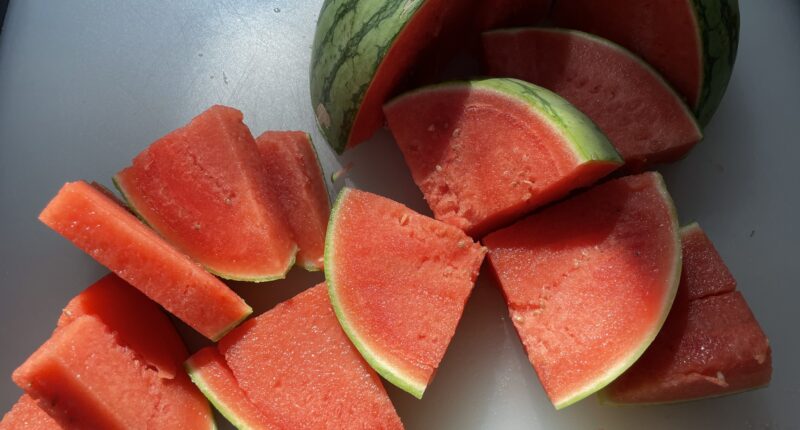Watermelon is a beautiful and delicious fruit as well. It is also extremely beneficial to your health. Here are eight important watermelon health benefits, how to pick perfectly ripe fruit, and a few ways to add it into meals, snacks, drinks, and desserts.
Watermelon Keeps You Hydrated
Water isn’t in this fruit’s name by chance. According to the US Department of Agriculture (USDA), a cup of watermelon contains approximately five ounces of water (about the size of a yogurt container). Consuming adequate fluid—including water-rich foods—supports circulation, skin health, and digestion. It also helps regulate body temperature, organ and joint function, metabolism, appetite, and waste elimination, according to a 2013 article in ACSMs Health & Fitness Journal.
Being properly hydrated also impacts mental performance. The same article in ACSMs Health & Fitness Journal shows that as little as a 1% to 3% loss of body fluid can impair mood, reduce concentration, increase headaches and fatigue, interfere with working memory, and boost anxiety.
It Has Key Nutrients and Few Calories
Watermelon is lower in calories and sugar than you may think. One cup of watermelon provides 45 calories from 11 grams of carbohydrates, nine grams of which are naturally occurring sugar, according to the USDA. That natural sweetness is bundled with vitamins A and C, which support immune function and skin health, and potassium, magnesium, B vitamins, and health-protective antioxidants.
It Helps Lower Blood Pressure and Improves Circulation
L-citrulline, a natural substance in watermelon (particularly in the white part of the rind), has been shown to improve artery function and lower blood pressure by helping blood vessels relax and improving circulation. A 2017 study in Clinical Nutrition and Metabolic Care also shows that L-citrulline may improve muscle oxygenation and athletic performance during endurance exercise.
It Reduces Muscle Soreness
In a 2014 study in the Journal of Agricultural and Food Chemistry, athletes who consumed 16 ounces of watermelon juice an hour before exercise experienced reduced muscle soreness and a quicker heart rate recovery compared to those who received a placebo drink.
Another study on male runners, published in a 2017 issue of Food & Nutrition Research, found that those who drank 16 ounces of watermelon juice enriched in L-citrulline two hours before performing half-marathon races had less perceived muscle soreness for up to 72 hours compared to those who downed a placebo beverage.
It Can Lead to Healthy Weight Management
Watermelon may help support healthy weight management when it’s consumed in place of a processed sweet snack. A 2019 study in the journal Nutrients looked at satiety and weight changes after a four-week intervention in overweight and obese adults.
During the study, one group was asked to consume two cups of fresh watermelon daily, while a second group ate low-fat cookies with the same number of calories as the watermelon. Participants were allowed to consume their snacks any time of day, during one or multiple sittings, or alone or in combination with other foods.
Researchers found that watermelon promoted greater satiety than the cookies and that satiety (diminished hunger, greater fullness, and a reduced desire to eat) lasted up to 90 minutes after eating. Additionally, the watermelon eaters lost weight, reduced their waist-to-hip ratios and blood pressure levels, and improved their antioxidant status and blood lipids.
Watermelon Offers Digestive Support
While watermelon isn’t very high in fiber, the fiber it does contain supports a healthy gut function. The fruit also contains fluid and prebiotics, a type of fiber that stimulates the growth and/or activity of beneficial bacteria in the large intestine, according to a 2016 study in Current Opinion in Gastroenterology. Prebiotics are tied to healthy immune function, anti-inflammation, and positive mood. Prebiotics also boost mineral absorption, improve blood glucose and insulin levels, and may protect against colon cancer.
It Helps Defend Against Disease
Watermelon is one of the best sources of lycopene, according to a 2014 study in Experimental and Clinical Sciences. Lycopene is an antioxidant known to combat oxidative stress, which occurs when there is an imbalance between the production of cell-damaging free radicals and the body’s ability to counter their harmful effects. Lycopene reduces the risk of chronic diseases, including heart disease, type 2 diabetes, and cancer, as well as neurodegenerative diseases like Alzheimer’s. For the most lycopene, opt for traditional pink flesh watermelon, which contains more antioxidants than yellow and orange varieties.
It May Protect Your Skin
If you’re a watermelon lover who takes full advantage of enjoying the fruit while it’s in season, it may offer some skin protection. Watermelon’s vitamins A and C support healthy skin, and the fruit’s lycopene content may protect against sun damage, although the effects are not immediate. One 2021 study in the Journal of Clinical Nutrition found that the ingestion of tomato paste, which provided 16 mg lycopene, reduced sun damage to skin. According to the USDA, a cup and a half of watermelon contains about 9 to 13 milligrams of lycopene.
ALSO READ: Packed With Nutritional Value, What Are The Health Benefits Of Strawberries?









